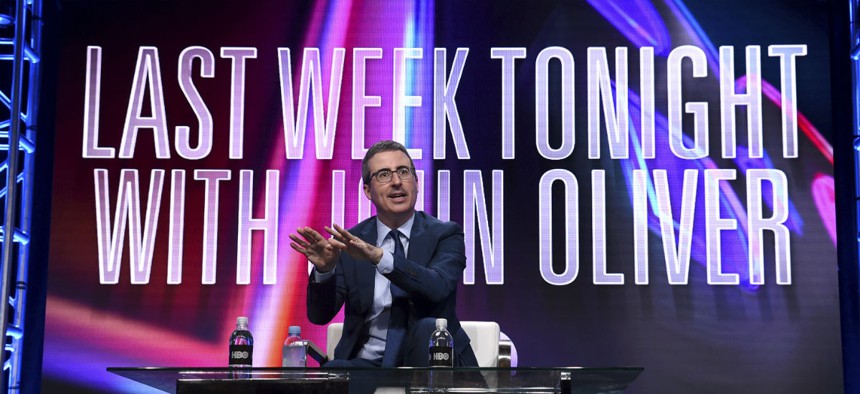FCC IG Says the Alleged Net Neutrality DDoS Attack Never Happened

John Oliver speaks during the "Last Week Tonight with John Oliver" panel during the HBO Television Critics Association Summer Press Tour at The Beverly Hilton hotel on July 25 in Beverly Hills, Calif. Richard Shotwell/Invision/AP
An internal investigation found the agency’s commenting system was knocked offline by “system design issues” and “‘flash crowd’ activity,” not hackers.
The Federal Communications Commission’s internal watchdog officially debunked claims that malicious cyber activity caused the traffic spike that briefly crippled the agency’s public comment system on May 7, 2017.
The delays likely stemmed from “system design issues” and “‘flash crowd’ activity” that came about minutes after “Last Week Tonight with John Oliver” finished a show on net neutrality, and was not the result of multiple distributed denial-of-service attacks as an agency official claimed, the FCC inspector general said in a report published Tuesday.
Oliver’s segment detailing the FCC’s plans to roll back the Obama-era internet service regulations aired around 11 p.m. on May 7, during which he urged viewers to send comments to the agency opposing the policy change. Around 11:30 p.m. the FCC Electronic Comment Filing System experienced “a significant increase” in traffic, which left some users unable to access the platform.
The next day, then-FCC Chief Information Officer David Bray issued a statement attributing the outage to multiple distributed denial-of-service attacks, which he said represented a “deliberate attempt” by bad actors to overwhelm the agency’s site to prevent people from filing comments. The claims, which were at the time backed by FCC Chairman Ajit Pai, caused a stir on Capitol Hill and eventually led the IG office to open an investigation into potential cybercrimes.
The report said increases in activity did not mirror the regular traffic spikes that are typical of DDoS attacks, but rather directly corresponded to Oliver tweeting the link to the FCC’s net neutrality page and posting the episode on YouTube.
Traffic to the site spiked more than 3,100 percent between May 7 and May 8, according to the report, and while investigators found “small amount of anomalous activity” during that period, they determined it was not enough to overwhelm the system.
In his May 8 statement, Bray said internal analyses found the outage stemmed from a cyberattack, but investigators found that was not the case. The FCC also failed to conduct the proper reviews to validate Bray’s claims, the report said. After analyzing emails between top officials, investigators uncovered significant disagreement about whether a cyberattack truly caused the event.
“The conclusion that the event involved multiple DDoS attacks was not based on substantive analysis and ran counter to other opinions including those of the ECFS subject matter expert and [FCC Chief of Staff Matthew Berry],” investigators wrote.
Even if the outage had been caused by a cyberattack, they added, “the FCC did not define the event as a cyber security incident, did not refer the matter to US-CERT in accordance with federal policy, and did not implement internal processes for responding to cyber security incidents.”
The IG also determined the FCC made a number of misleading or false statements to Congress in response to lawmakers’ inquiries about the blackout.
In a statement on Monday, Pai laid much of the blame for the incident on Bray—though he called him by his title, not his name—and noted he was “pleased that this report debunks the conspiracy theory that my office or I had any knowledge that the information provided by the former CIO was inaccurate and was allowing that inaccurate information to be disseminated for political purposes.”
He also said Congress recently approved funding to redesign the FCC’s public commenting system.
Bray took a position as the executive director of the People-Centered Internet Coalition last August. In a statement to Nextgov, the organization said the IG never contacted Bray, and he has yet to see investigators’ findings.
NEXT STORY: As the IoT grows, so do the risks



